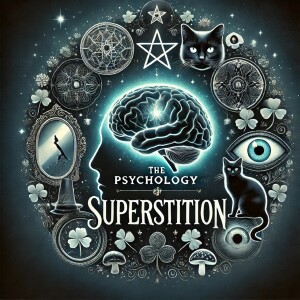The Psychology of Superstition
This podcast explores why people believe in superstitions, using insights from cognitive psychology, behavioral science, and cultural anthropology. Each episode delves into different aspects of superstition, from historical origins to modern manifestations, and examines psychological research on belief formation, pattern recognition, and the human need for control.
Episodes

Saturday May 17, 2025
Saturday May 17, 2025
This episode explores why athletes and fans are among the most superstitious people. It examines the psychological benefits of rituals, like increased confidence and reduced anxiety, and explains concepts like the placebo effect, confirmation bias, and contagion theory. From Michael Jordan’s lucky shorts to fan traditions like the "Terrible Towel," the episode reveals how superstition can shape performance, identity, and community in the world of sports.

Sunday May 04, 2025
Sunday May 04, 2025
This episode explores the psychology behind rituals, such as knocking on wood or avoiding ladders. It explains how rituals—though often irrational—reduce anxiety, provide a sense of control, and offer comfort in uncertain situations. From ancient beliefs to modern habits, the episode shows how rituals are a natural human response to fear, stress, and the desire for meaning.

Saturday Apr 12, 2025
Saturday Apr 12, 2025
Explores why certain numbers are seen as lucky or unlucky across different cultures. It delves into the fear of 13 (triskaidekaphobia), the widespread belief in 7 as a symbol of perfection and luck, and the avoidance of the number 4 in East Asia due to its association with death. The episode also examines the role of numerology, cultural traditions, and psychological factors in shaping these beliefs, as well as how they influence real-world behaviors—from property values to personal choices.

Wednesday Mar 26, 2025
Wednesday Mar 26, 2025
Early humans developed superstitions to find patterns in chaos, helping them survive unpredictable dangers. Concepts like patternicity and agency detection explain why we see meaning in random events and assume hidden forces control outcomes. Superstition also provided a sense of control, reducing anxiety in uncertain situations. Despite scientific advancements, these instincts remain, influencing modern beliefs and behaviors.

Monday Mar 10, 2025
Monday Mar 10, 2025
This episode explains how associative thinking leads to superstitious beliefs, such as wearing a "lucky" shirt for an exam. It also delves into the evolutionary origins of superstition—humans developed a preference for false alarms over real dangers as a survival mechanism.



